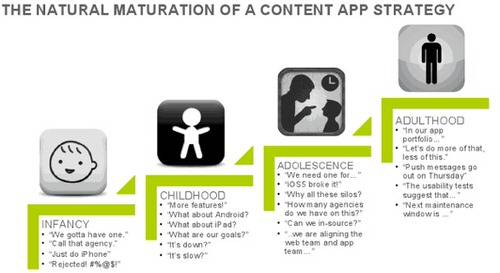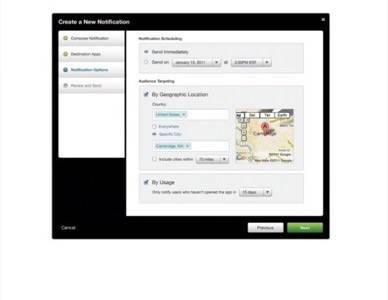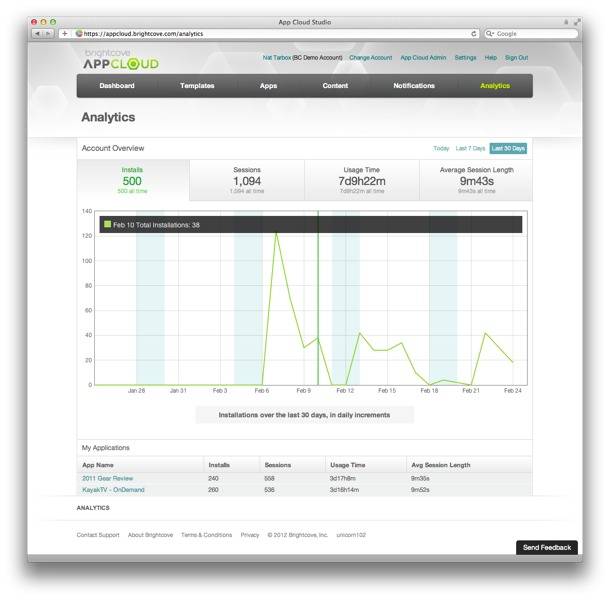

Brightcove does not want you to think of it as a video hosting company. From the beginning, that was never the plan. Yet, Brightcove rode its cloud video-hosting platform to an initial public offering last week,with the company valued at about $392 million. Brightcove considers itself a “cloud content services” company and wants to be the go-to resource for publishers storing and delivering media from the cloud.
Brightcove’s next big project, dubbed App Cloud, is creating content containers for mobile HTML5 apps. The popular term for this is “wrappers” – taking apps written in Web languages and wrapping them with native functionality. Facebook and PhoneGap were the first to implement this practice but Brightcove thinks it can take it a step further, creating an entire platform for hybrid app development, as opposed to just a series of tools.
In an hour long meeting with Brightcove in their Cambridge, Mass. offices last week, it became clear that App Cloud is more than just a tool for HTML5 hybrid app development. The PowerPoint slide deck for App Cloud looks like a “Best of ReadWriteMobile” summary (without specifically mentioning ReadWriteMobile). Brightcove has done its research, taken the long-view approach and created a platform that has aspects of mobile development tools created by vendors across the United States.
“It is not just a generic app platform, it is specific to content apps,” said Jeff Whatcott, SVP for marketing at Brightcove. “We built our platform to target content apps specifically. The reason for that is that as a company we think of ourselves as a cloud content services company. We are passionate about content experiences and about using the model of the cloud to help people build businesses around content. This is not a general purpose platform, this is specific.”
Let’s look specifically at what the Brightcove App Cloud does before comparing it with other services.
Brightcove provides a dashboard for creating mobile apps out of HMTL5, JavaScript and CSS and then wrapping them for Android and iOS deployment. Content can be pulled from a variety of sources including video feeds (of course, being Brightcove), social channels, RSS feeds among others. Wherever content can be found, it likely can be pulled into the App Cloud. The platform provides a wide array of custom templates that publishers can use to differentiate apps across several different content sources. Brightcove then compiles all of that content in its cloud, creates a visual rendition of it and serves the binary that the publisher can then take to Apple and Google to be submitted to the App Store and Android Market.
Today Brightcove announced the first series of value-added services around this system, bringing “intelligent” push notifications and dashboard analytics to the platform. The push notifications can be targeted at users in a specific geographic area, by time spent (or not spent) in the app, or a general combination of these attributes. The analytics can tell in real-time the effectiveness of the push notifications and track the effectiveness of a single piece of content (such as a blog post or a video).

“Anything that can expose data via REST-based APIs we can access it. You then load up our SDK and what is called App Cloud Workshop to build your apps,” Whatcott said. “You then put the custom template in HTML5, uploaded that to App Cloud and then in App Cloud you can visually assemble apps without having to code.”
The Holistic Approach
The goal for Brightcove is to bring mobile apps to the “adulthood” stage of development. See the chart at the top of this post.
“As you can see, as they grow from infancy to childhood to adolescence to adulthood, there are kind of a lot of issues,” Whatcott said. “We are looking at this and seeing that a lot of organizations are trapped in infancy and childhood and maybe some have moved into adolescence. We want to figure out how to provide a platform that brings apps to adulthood. That is where the gravitational pull is. Every organization in the future is going to have many apps for all kinds of customer segments and products that they offer. They are going to need to be able to manage those and operate those in a sustainable fashion. Right now everybody is just kind of obsessed on how I build them. We are trying to shoot in front of the duck.”

Taken on separate basis, Brightcove’s tools are similar to many others on the market. Whatcott said that the company has thought about breaking the platform into separate a la carte pieces but that is not currently the plan. The idea is to get enterprises to build their apps with one top-to-bottom system. The pricing for App Cloud comes in two flavors. It is free to use the product and build and test as many apps as you would like but to actually get the binary for the App Store or Android Market, companies need to sign up for the premium enterprise edition that costs $15,000.
In terms of similarities, Brightcove’s custom templates and workshops look a lot like the app building tools that Conduit offers. Conduit offers more wrappers for native environments while Brightcove offers only Android and iOS at this point. The development dashboards for Conduit and Brightcove look a lot alike. From a push messaging perspective, several companies provide this functionality with the most prominent startup in the realm as Portland-based Urban Airship. From an engagement analytics perspective, Apsalar and PlayHaven both offer dashboards for tracking users and sending push notifications and engagement messages. HTML5 development studio appMobi provides many similar functions to Brightcove but has released its APIs as free, open source tools to developers.
“Where this is going is that people are going to manage whole portfolio of apps and we want to reduce the number of tools that they have to use,” Whatcott said. “As opposed to having 19 different vendors and having to integrate all those different pieces together. We have seen this in the video cloud business.”
The difference between Brightcove and the individual tools available through other vendors and startups is that small developers are cost-prohibited from using the App Cloud. Brightcove is focusing on the enterprise-level content app for marketers and large media companies, like Fox. While the end-to-end solution may be one of the most robust on the market, the small to medium app publishers are cut out with the pricing model.
Developers: Are you more likely to pick and choose from the a la carte vendor ecosystem or pony up for a platform like Brightcove’s App Cloud? Let us know how you think the platform works in the comments and what services you might use instead.

















